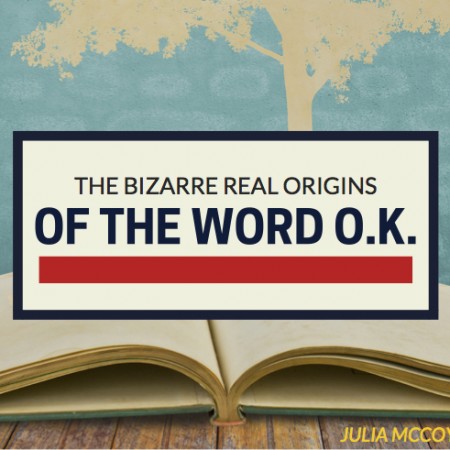The Bizarre Real Origins of the Word OK
Did you know? There are more theories about where the word OK comes from than letters in the word itself. That constitutes a Star Trek Captain Jean-Luc Picard facepalm meme, don’t you think? For a simple, relatively well-used phrase, shockingly few people actually know where it comes from. The real origins of the word okay (O.K.) are little known. Okay, as defined by Oxford dictionary is, “a term used to express agreement or acceptance.” In its modern usage, okay is a word that is recognized around the world along with its even more widely recognized acronym “OK”. But where does it come from? What’s the etymology of a word like “okay”? Origins of the Word Okay: Initial Theories In order for etymologists to determine where any word comes from, they trace its usage down the line until it disappears, giving an estimated time frame for when it appeared and got adopted into common usage. “Okay” has some obscure roots, since most people believe one (or more) stories about where it comes from above all others (depending on which one they heard first). Some rumors put it as coming from another language. In fact the foreign language interpretations of the origin of “okay” span a handful of locales such as: – Haitian French, from the term “Aux Cayes” – Scottish, derived from “och aye” – Greek, derived from “olla kalla” – Louisiana French, derived from “au quai” – Chocktaw (American Indian) from “okeh” There’s a lot of other attributions to language but the evidence behind these claims don’t stick. At best, these are simply inventions by local folk in an effort to claim the right over one of the most used words in the English language. Professional Jargon? There have been instances when professional jargon passed into common usage via popular culture. One notable example is the term “mark twain”, a phrase used by Mississippi riverboat oarsmen to determine the maximum depth to which a river boat would sail without become grounded. Samuel L. Clemens adopted it as his nom-de-plume and now the term is a household name, albeit for something totally different. Some origins of the word okay beg to dig deeper. There have been claims that the term “OK” comes from a time when shipbuilders would mark particularly robust pieces of lumber for use in the outer keel of ships. These pieces were marked “OK” to delineate their use in the outer keel. Another popular tale is that of the damage report during the civil war. It was said that, in order to save time and avoid a useless headcount, regiments that had no deaths would hold up a sign with the letters “OK” on it, standing for “Zero Killed”. Sadly, as colorful as these stories are, they aren’t even close to the truth. So Where DOES “Okay” come from? After exploring the colorful past of the word “Okay”, the truth might seem a far cry from the glamorization that exist around the word itself. Let’s look at the real origins of the word okay (OK): According to Merriam Webster, back in 1839 it was en vogue to facetiously misspell words in order to come off as humorous. Think about it in today’s terms as acronyms such as “OMG”, “lol” and “tl;dr”. Enter the newspaper editor who thought that spelling the term ‘all correct’ would be a lot funnier if it was spelt “orl korrect”. The abbreviation of “OK” was born and from that comes our modern word. So there you have it. The stories surrounding the word “okay” are numerous and colorful, stretching out through the mists of time. The truth about the word isn’t nearly as entertaining, but just like some topics, the deeper you get into it, the less interesting it seems. Regardless of its origins, “okay” is a word that makes up a large portion of our daily word usage and its versatility is a testament to the evolution of the English language.
